The Bay Area Food Movement Tackles Trump
Shelby Pope, Bay Area Bites
March 30, 2017

The food world’s response to President Trump has varied. Farmers, from the Central Valley to Midwest, supported him. Restaurant owners are grappling with how political they can be without risking business. Some have declared their businesses “sanctuary restaurants,” while others, like the restaurant group that recently opened a restaurant in a Trump-owned hotel, simply see working with the president as a good business decision. But in the Bay Area, the food world is ready to resist.
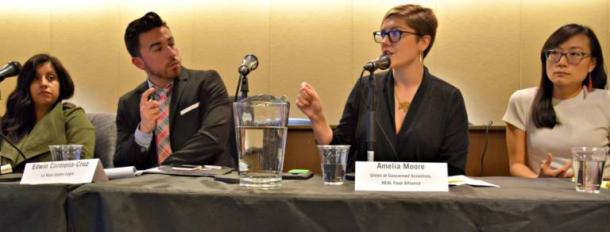
That was the focus of a March 23 CUESA event called “Resist Together! Reframing the Food Movement,” where panelists Evelyn Rangel-Medina of the Restaurant Opportunities Centers United, Edwin Carmona-Cruz from La Raza Centro Legal, Amelia Moore from the Union of Concerned Scientists, Leslie Mah from Nourish|Resist and the moderator, writer Stephen Satterfield, discussed the intersection of food and activism in the age of Trump.
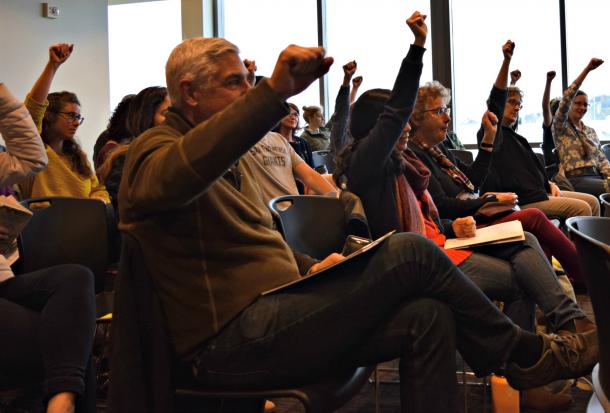
The crowd at CUESA’s event. (Shelby Pope)
CUESA director of education Julie Cummins introduced the event by emphasizing the need for people to think of food with a “bigger lens”: to think less about food itself and instead focus on the social and political issues in which our food is produced and made. Mah agreed, talking about how people need to shift how they see the food movement, and go from making passive food choices (whatever’s cheapest at the store) to active ones (Did that apple come from a farm in California or Mexico? Do the farmers take advantage of their workers?). The focus needs to be on “good food meets food justice,” Mah said.
The panel discussed the problems that Trump’s focus on illegal immigration can cause restaurants. Carmona-Cruz discussed how La Raza leads trainings for restaurants about what to do if ICE comes knocking at their door. Undocumented restaurant workers are often taken advantage of, he said, made to work for much less than minimum wage. “We have to realize that good food equals good practices,” he said. “We like to think about it in an intersectional way.”
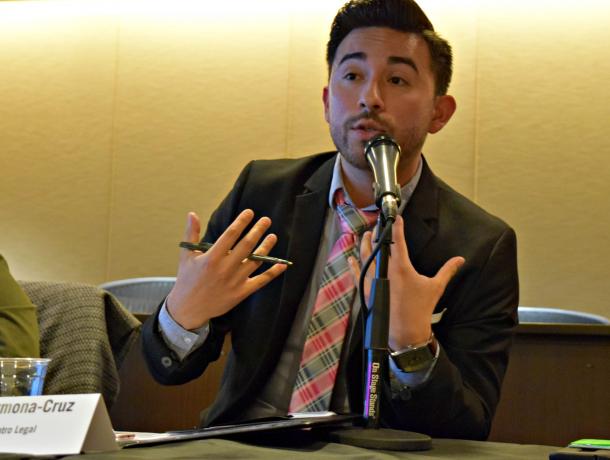
Panelist Edwin Carmona-Cruz, from La Raza Centro Legal. (Shelby Pope)
Intersectionality is key, Moore said. It’s not just about people buying most of of their produce from the farmers market. For the food system to become more equitable as a whole, she said, people have to collaborate with other social justice movements, like Black Lives Matter.
“Our food system is reliant on people of color and immigrants,” Rangel-Medina said, adding that any food movement needs to be relevant for everyone, from restaurant workers to the people who pick our food. She mentioned the uncomfortable dichotomy that anyone who’s dined out in the Bay Area has observed. Why are Latino workers consistently working in back-of-house positions, while the the bulk of front-of-house workers—who generally make more money, and serve as the face of the resturaunt—white? Yes, it’s awkward for well-intentioned Bay Area liberals to discuss these kinds of inequities. Yet, it’s vital, Rangel-Medina said. “If we don’t do this hard work we end up with Trump.”
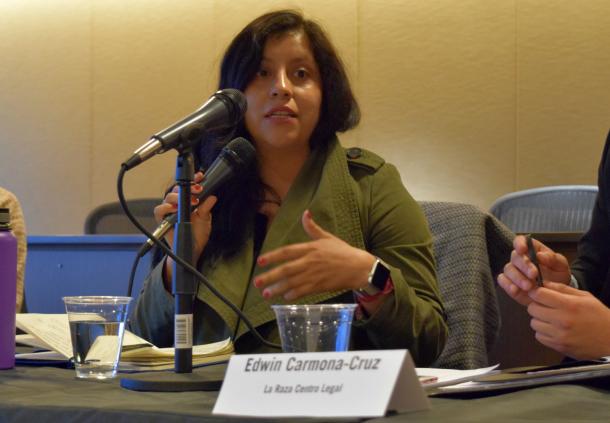
Panelist Evelyn Rangel-Medina, from Restaurant Opportunities Centers United. (Shelby Pope)
The fear and uncertainty that Trump’s presidency has created isn’t anything new, she added. “People of color have already been living in a Trump-like America.” Rangel-Medina pointed out that California, bastion of progressiveness and leader of the Trump resistance, is also the state that passed Proposition 187 in 1994, which denied undocumented Californians access to health care and education. We can’t rest on our laurels, confident that things will sort themselves out, believing that the Bay Area is somehow immune to Trump’s agenda, she said. We have to work hard to create a different future. “If we can create a demand for organic food, we can also demand racial equity,” she said.
That sentiment—in order to create change, people have to get out of their comfort zones—was echoed by the panelists. Moore mentioned her conservative Uncle Tom (yes, his real name) and the need for “conversations across the aisle. We need to be collaborative.” Carmona-Cruz echoed her sentiments. “We as citizens need to put our bodies on the line for the first time,” he said.
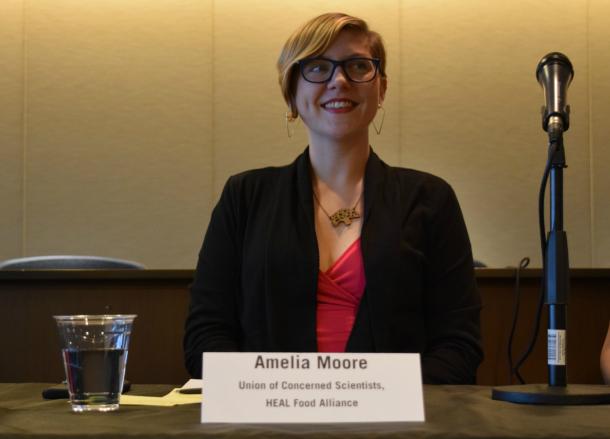
Panelist Amelia Moore, from the Union of Concerned Scientists. (Shelby Pope)
“Intention is no longer enough,” Satterfield said. So what can people do? Carmona-Cruz advised that everyone should know what to do if ICE comes to your door, and if a raid does happen, to make it as public as possible: “Take out your phone, Facebook Live it.” If you’re somewhere where you think an ICE raid might be taking place, you call (415) 200-1548, a 24-hour hotline managed by SF Rapid Response Network that will dispatch an observer to verify the raid and provide an attorney for detainees. He also encouraged people to look beyond national organizations like the ACLU and find a local group when considering where to donate.
If you work at a restaurant, urge it to become a sanctuary restaurant, Rangel-Medina recommended. She also recommended supporting the bill for California to become a sanctuary state.
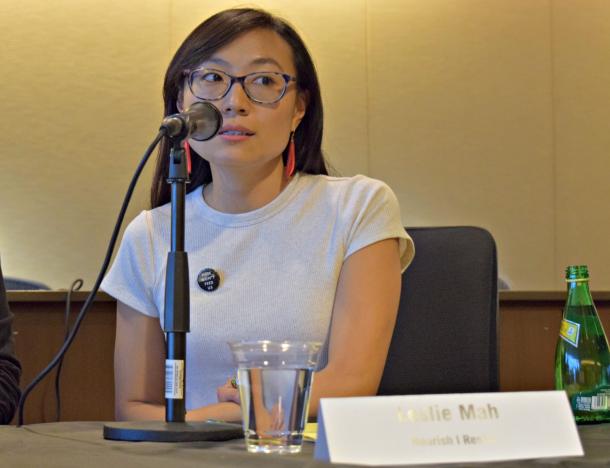
Panelist Leslie Mah, from Nourish|Resist. (Shelby Pope)
It will take hard work to fight Trump (who Carmona-Cruz referred to as “Cheeto man”) and his policies, the panel agreed. But as Mah pointed out, food can be an ideal starting point for political discussion, a way to find common ground with people who don’t share the same beliefs: “Everyone has to eat,” she said. “It’s a place to realize that you and I are the same.”
“Resist Together! Reframing the Food Movement” was presented by CUESA. The original piece was posted at KQED Food’s Bay Area Bites.
Find additional coverage of the event at The New Food Economy.
For more food for thought, join CUESA at Cooperatives: Democratizing the Food System on April 24.
Topics: Equity, Food policy, Talks
